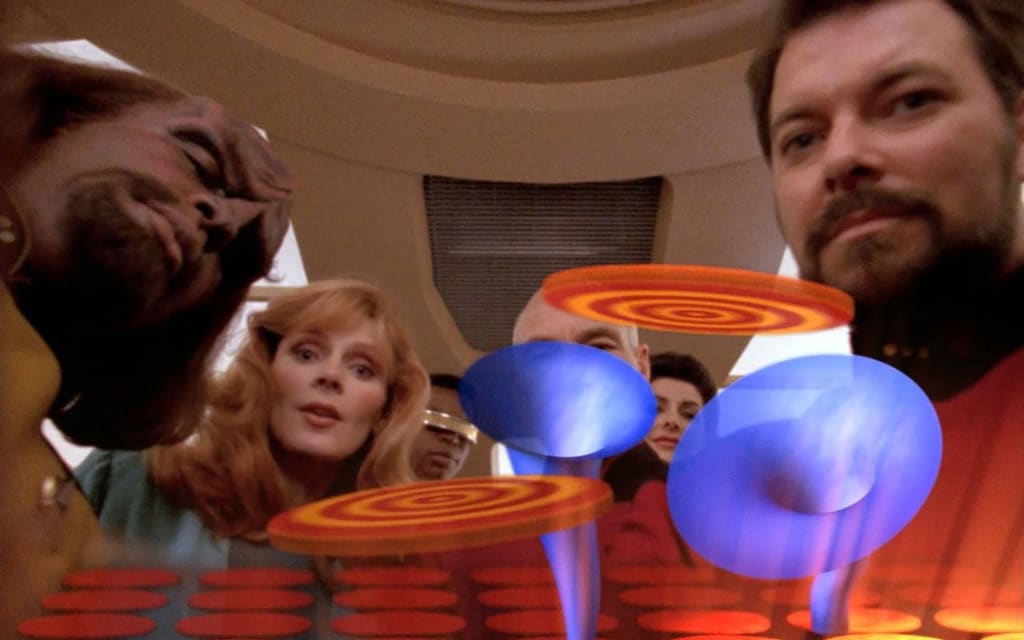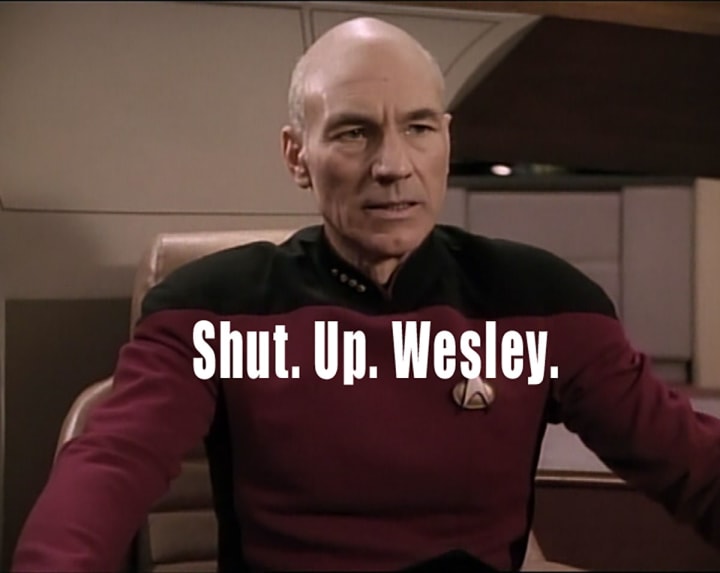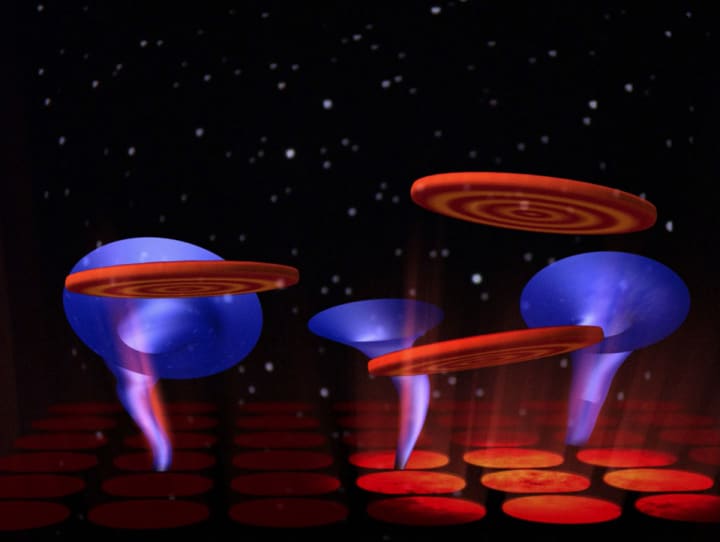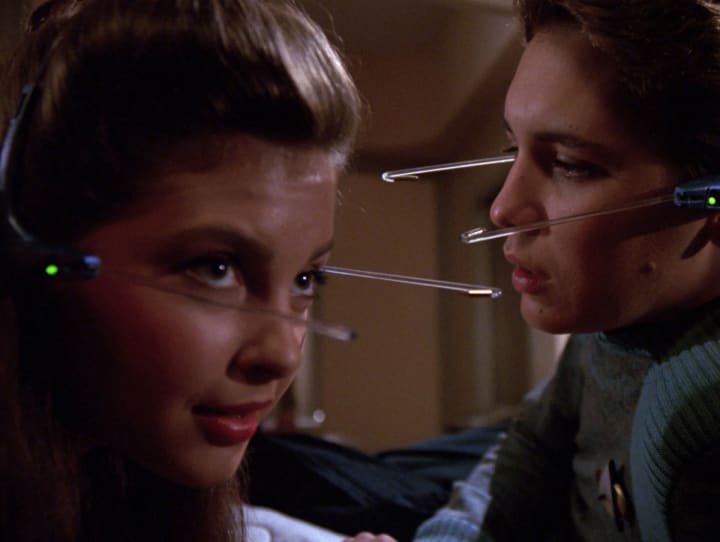‘The Game’ of Pokémon Go According to Next Generation’s Wesley Crusher
Star Trek: The Next Generation's episode 'The Game' predicted a virtual reality game eerily reminiscent of Pokémon Go.

“Shut up, Wesley!” – Captain Picard in “Datalore,” Star Trek: The Next Generation, First Season.
It was an excruciatingly memorable moment when Patrick Stewart’s noble Starship leader blasted young Wesley Crusher in his distinctive baritone voice. Captain Picard admonished Wesley and shushed his Chief Medical Officer’s son in dramatic fashion. He only said it once on Next Generation, but he’d never be saying it these days. Wesley Crusher—aka actor Wil Wheaton—can now officially be numbered among Earth’s iconic, and even mythic champions. Not that Wesley didn’t do some truly incredible shit before, but this isn’t only technical geeky bliss, but also truly Earth-shattering. Wesley Crusher warned us. We didn’t listen. Now, a Japanese video game, Pokémon Go, has taken us over. Will the galaxy and then the universe be next for the harvesting?
In the TNG episode "The Game," Cadet Wesley Crusher, visiting the Enterprise-D, fresh from Starfleet Academy, stumbles upon a dastardly alien conspiracy— aliens are morphing Captain Picard’s crew into mindless, video game playing zombies. The Walking Dead meets The Gaming Starfleet in this quirky cautionary tale.
Today’s mind-numbing mobile game mega hit, Pokémon Go, plays suspiciously like that fictional game—so let’s see just how Wesley dealt with it. Maybe, if we’re lucky, we'll see if we can apply a Starfleet-savvy strategy to the Pokémon Go addicts of today.
The Meme Scene, Too Mean?

"Shut up, Wesley!" has taken off as a Trek meme. Cheeky configurations of it can be found far and wide on the net. It’s become such a social media nuisance that Twitter champ Wil Wheaton blocks all who tweet him the phrase or a graphic of said meme. Despite those who argue the phrase has now taken its place alongside lovable Trek slogans such as "Beam me up, Scotty," "Let’s see what’s out there," or "Live Long and Prosper," it irritates the actor, and he’s made it verboten in his cyber world of social media goodness.
Wheaton tweeted: NEW RULE: I'm officially over people saying "shut up, Wesley" to me, even in jest. From now on, I'm insta-blocking anyone who does that.
However, even in the real world, there’s that wacky thing called hierarchy. Sir Patrick Stewart—Jean-Luc Picard himself—weighed in on the controversy and here’s his royal commanding take on it:
@SirPatStew @wilw Shut up Wil.
Game, Set, and Match? The fun conflict sets up a notion of Wesley Crusher being written—certainly in the early days of TNG—as little more than an irritating plot device, a tech-y solution-spouting cypher. Now that the net has exploded with "SHUT UP, WESLEY!" memes and animated gifs—it’s all the more wonderful how Wheaton escaped a sad ghetto of being the one character on Star Trek who was most joyously despised—until Neelix on Voyager came along.
When I starting writing for TNG and pitching to Trek, Wesley was gone, but writing guidelines Paramount sent always included a reminder to NOT pitch stories involving recurring characters such as: Guinan, Q, Ensign Ro, or Wesley Crusher. I always felt Wheaton’s work was excellent, but I never whipped up a story pitch for him, since the guidelines discouraged me from attempting a Wesley epic. But of all the "Wesley returns" episodes, "The Game" remains a wild ride—for storyline, execution, and a certain young guest co-star.
‘The Game’ Predicts Pokémon Go and Ashley Judd’s Ascendance

Image via Memory Alpha Wikia
Gene Roddenberry may not have been psychic in a Kreskin kinda way, and certainly he was no gypsy fortune teller (dilithium crystals, not crystal balls), but the visionary writers he assembled coupled with his own innate feel for science, technology, and the future bestowed on Star Trek a kind of impressive clairvoyance.
Trek’s not only forward-looking in a socially responsible way—it always strives to get science right. It’s now a long-established fact that Trek inspired gadgets we take for granted today—the flip top cell phone to name one—but it also looks at the advent of the proliferation of video game worship or mania with more than a wary eye.
Before "The Game," there was a Lt. Barclay cautionary tale of another sort, the TNG episode "Hollow Pursuits." Barclay, a social misfit by any society’s standards, spent his free time romping about the Ent D’s snazzy Holodeck engaged in play with holographic simulations of crewmates—including superiors. Not quite a video game—or perhaps the ultimate in simulation games—Barclay seems to detach himself responsibly from the cyber playground at the close of the tale. There was a big logistic reason why Barclay may have been able to strip himself more easily of the Holodeck’s hypnotic allure: You can’t carry a holographic playroom around in your pocket, or in the case of "The Game," on your head.
Once those handheld gadgets went mobile—way back with Nintendo GameBoy or SEGA’s GameGear—the era of the mobile gamer was born. Now, with Pokémon Go, a sort of reinvigorated Geocaching cult of personality coupled with crowdsourcing has taken hold of a generation or two—or three—of players, and there seems to be no end to the fun, frolic, and sometimes folly. All nestled in the same device used to text and do your banking. How do you resist a Holodeck in your pocket or pocketbook?
One of the more fun aspects of Wesley’s gamer-busting romp is guest star Ashley Judd in the role of Ensign Robin Lefler. Judd’s appearance on TNG in a previous episode was her first professional role for TV, and producers created the role as a romantic partner for Crusher when she’d come back for a visit. After hanging around romantically with Cadet Crusher, it was rumored she’d appear as his wife in the film, Star Trek: Nemesis. It never happened, since Wheaton’s scene was cut from the theatrical release. But Judd started the rumor by joking around on David Letterman’s talk show.
Wesley and Lefler's Solutions for Dummies to Gamer Addiction

Image via Tumblr user The Rules of Acquisition
So how do Wesley and Lefler manage to thwart an alien conspiracy to take over the Enterprise and then Starfleet itself? First, let’s see what Crusher’s alter ego, Wil Wheaton, says on the whole affair.
Wheaton tweeted: Look, I warned you about Pokémon Go way back in the 90s. None of you listened to me then, and you better hope @BrentSpiner saves you now.
Brent Spiner—Mr. Data himself. Interesting. Can it be so easy? Can the man who fleshed out the most beloved artificial intelligence on Trek make a difference? Remember, as a synthetic construct, Data is immune to our "human flaws"—all those nasty weaknesses and foibles which make life so fun and worth living. He makes Spock look like a fraternity brother partying down. Wesley tells Lefler that in order to battle this cyber plague, they need advanced tech. This game is so addictive that there’s only one person aboard we can be sure wouldn’t be affected by it.
Lefler: Data! Yep. Enter: Ole Yellow Eyes.
In the end, Wesley and Lefler recruit Data in the fight. The android modifies a lowly palm beacon—a flashflight—which cycles light patterns at a frequency to dispel neurological effects of the nefarious mobile gaming headsets. Use far superior tech—in the guise of an android—to win the battle? Fight cyber fire with cyber flame?
If you think TNG’s "The Game" and Wesley’s saving the day is merely harmless fiction compared to Pokémon Go, one respected American filmmaker is not only not a fan of the mobile game fad, but he thinks it’s far more insidious than even a TNG tale. Director Oliver Stone recently said this about Pokémon Go:
“It's not really funny. Their search for profits is enormous here, enormous. Nobody has ever seen in the history of the world [a company like] Google. It's the biggest new, fastest growing business ever, and they have invested a huge amount of money into what surveillance is—it's data mining. They're data mining every single person in this room for information as to what you're buying, what you like, and above all, your behavior. So Pokémon Go kicks into that.It's not for profit at the beginning but it becomes for profit at the end, because it creates its own awareness and it gets to us everywhere in the world, until it manipulates our behavior and we start to act like that. It has happened a bit already out there on the internet, but you'll see a new form—frankly, a robot society where they all know how you want to behave. It's what they call totalitarianism.”
As always, the provocative film director of controversial films such as JFK and Natural Born Killers is highly opinionated with his social views. Who knows— perhaps Oliver Stone will hire Mr. Wesley Crusher as consultant for his next big sociopolitical exposé.
About the Creator
Will Stape
Screenwriter, book author, and producer. Wrote for 'Star Trek: The Next Generation & Deep Space Nine,' and has created docudramas for cable TV and the web.






Comments
There are no comments for this story
Be the first to respond and start the conversation.